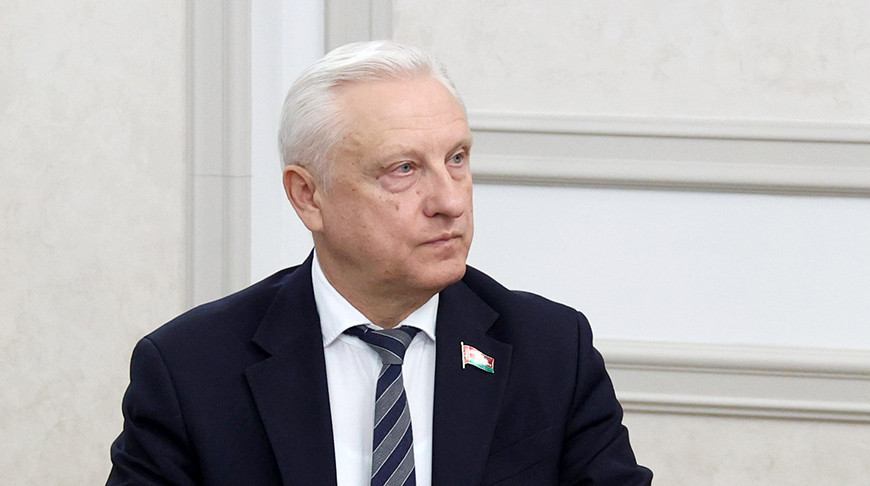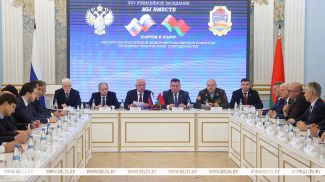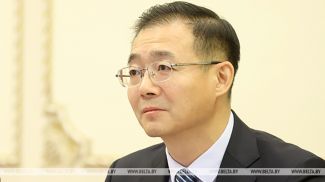
MINSK, 14 October (BelTA) — The role of parliaments in preventing and combating terrorism cannot be overestimated, Sergei Rachkov, chairman of the Standing Committee on International Affairs of the House of Representatives of the Belarusian Parliament, said at a meeting of the High-Level Advisory Group on Countering Terrorism and Violent Extremism of the Inter-Parliamentary Union (IPU) in Geneva on 13 October, BelTA learned from the press service of the House of Representatives.
The event featured expert hearings on emerging threats and trends in counter-terrorism. The participants discussed new strategies and the role of parliaments in preventing terrorism and violent extremism stemming from it.
The role of parliaments in preventing and combating terrorism, and in preventing violent extremism arising from it, cannot be overestimated.
Sergei Rachkov noted that the Belarusian legislation has addressed the issues of countering terrorism and extremism within the framework of a large-scale reform that took place in recent years. The laws fully comply with Belarus' international obligations and are based on international experience in combating such crimes, including that of Western countries. "The national legislation have been revised based on the significantly increased risks connected with the calls for terrorist and extremist acts by various politicized groups based abroad seeking to overthrow the government in Belarus, and by foreign sabotage groups that already attempted to organize terrorist attacks in our country," he said.
According to Sergei Rachkov, the strengthening of counter-terrorism measures is caused, among other things, by the ongoing regional armed conflict, which may escalate and expand further. "A number of Western parliamentarians continue to openly support self-exiled extremists who participated in the failed attempt of 'color revolution' in Belarus in 2020 and now declare their readiness to overthrow the legitimate Belarusian government by terrorist activities. Every self-respecting state, including countries with 'developed democracies', would consider such actions as a direct threat to national security. Any support of such extremist organizations is a direct interference in the internal affairs of a sovereign state," he emphasized.
"We strongly condemn the selective approach of some countries to the fulfillment of their international obligations to cooperate in combating terrorism. The Belarusian side considers the politically motivated refusal of certain states to cooperate with the relevant authorities of other countries to identify and prevent cases of terrorism and to provide international legal assistance as a gross violation of the international law and the principles of civilized relations," Sergei Rachkov added. "We suggest harnessing the significant potential of inter-parliamentary diplomacy and the IPU to effectively prevent terrorism and violent extremism and to integrate best practices into the work of national parliaments and inter-parliamentary structures."
The event featured expert hearings on emerging threats and trends in counter-terrorism. The participants discussed new strategies and the role of parliaments in preventing terrorism and violent extremism stemming from it.
The role of parliaments in preventing and combating terrorism, and in preventing violent extremism arising from it, cannot be overestimated.
Sergei Rachkov noted that the Belarusian legislation has addressed the issues of countering terrorism and extremism within the framework of a large-scale reform that took place in recent years. The laws fully comply with Belarus' international obligations and are based on international experience in combating such crimes, including that of Western countries. "The national legislation have been revised based on the significantly increased risks connected with the calls for terrorist and extremist acts by various politicized groups based abroad seeking to overthrow the government in Belarus, and by foreign sabotage groups that already attempted to organize terrorist attacks in our country," he said.
According to Sergei Rachkov, the strengthening of counter-terrorism measures is caused, among other things, by the ongoing regional armed conflict, which may escalate and expand further. "A number of Western parliamentarians continue to openly support self-exiled extremists who participated in the failed attempt of 'color revolution' in Belarus in 2020 and now declare their readiness to overthrow the legitimate Belarusian government by terrorist activities. Every self-respecting state, including countries with 'developed democracies', would consider such actions as a direct threat to national security. Any support of such extremist organizations is a direct interference in the internal affairs of a sovereign state," he emphasized.
"We strongly condemn the selective approach of some countries to the fulfillment of their international obligations to cooperate in combating terrorism. The Belarusian side considers the politically motivated refusal of certain states to cooperate with the relevant authorities of other countries to identify and prevent cases of terrorism and to provide international legal assistance as a gross violation of the international law and the principles of civilized relations," Sergei Rachkov added. "We suggest harnessing the significant potential of inter-parliamentary diplomacy and the IPU to effectively prevent terrorism and violent extremism and to integrate best practices into the work of national parliaments and inter-parliamentary structures."













